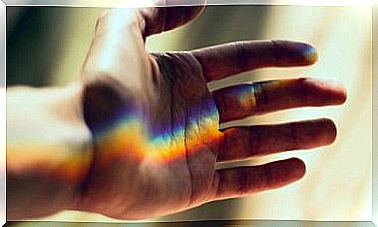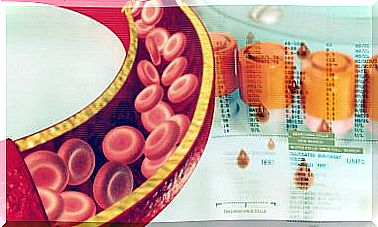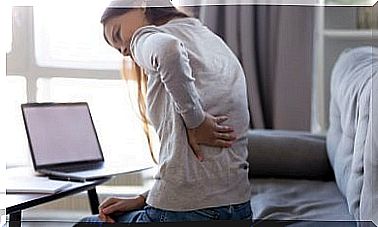Nocturnal Anxiety: Symptoms, Causes And Therapeutic Measures
Trouble falling asleep, a mind that does not stop “manufacturing” worries, sweating, increased heart rate, a feeling of suffocation … Nighttime anxiety is more common than we think. So much so, that it may be behind the recurrent insomnia that cuts our quality of life.
It is important to know that a significant part of sleep disorders is directly related to anxiety states. In this way, it is more than common that when night comes and longing for a good rest, what we get is just the opposite.
Thus, conditions such as generalized anxiety disorder or even post-traumatic stress are clear triggers for poor night’s rest. Moreover, something that usually happens is the following: nervousness and anguish increase when night falls.
Much of the physiological and emotional arousal accumulated during the day is internalized until resulting in a state of nocturnal hyperactivity. Thus, it is very common, for example, to suffer an anxiety attack during the early morning hours.

Nighttime anxiety: the hidden manifestation of a problem
We define nocturnal anxiety as that state of hyperarousal and alert response that erupts in the middle of the night’s rest. Also, there is something evident: this alteration appears frequently in people who suffer for months the feelings of worry, restlessness and anguish.
On the other hand, seeing our sleep cycles altered in these situations is common. Likewise, it is also important to reach our bed at night and lose ourselves in the labyrinth of thoughts, thus feeding back the cycle of anxiety.
It will not surprise us to know, therefore, that a good part of those who suffer from insomnia often show a marked anxiety that is rarely treated. Studies such as those carried out by Dr. Luc Staner of the Rouffach Hospital (Maryland, United States), for example, indicate that the prevalence of anxiety among those who suffer from sleep disorders would be between 24 and 36%.
The figure is high enough to consider the seriousness of this relationship. We cannot forget that a chronic bad night’s rest can be the origin of different diseases.
With what symptoms does it present?
One of the main characteristics of those who suffer from night anxiety is hyperarousal. Not only does the mind seem more willing to drift into worry; the body, although exhausted, accumulates tension, as if we were prepared to escape or launch into a race.
In addition, the following signs are identifiable:
- It is common to feel rapid heartbeat, pressure in the chest, and a feeling of suffocation.
- Headaches or pricks in the temples are also common.
- It may take hours for the person to fall asleep and when they do, they experience frequent awakenings.
- Night anxiety is accompanied by the feeling of not having rested. This is explained by the difficulty of reaching REM sleep (r apid eye movement), essential to confer deep sleep and to be able to carry out tasks such as information processing, learning and memory consolidation.
- Lack of REM sleep further intensifies emotional distress, increasing anxiety itself.
- On the other hand, there is an important detail: when the disorder reaches high levels, the person can suffer an anxiety attack.
What are the causes of nighttime anxiety?
Mariano Chóliz, professor at the University of Valencia, has an interesting research work on anxiety and sleep disorders. In it, he talks about what is known as the Monroe hypothesis (Monroe, 1967). According to this approach, the origin of nocturnal anxiety would be in the following aspects:
- People who suffer from this condition are characterized by a higher degree of physiological activation ( arousal according to the technical term used in neuronal physiology): they suffer a higher respiratory rate, a higher body temperature, as well as a more intense muscular tension.
- To this symptomatology are added cognitive factors (negative thoughts and worries) and emotions (anguish, fear): all of this orchestrates that symptomatic triangulation that intensifies anxiety during nighttime periods.

How can we treat anxiety that rises at night?
Anxiety and associated insomnia are just symptoms of an underlying problem. In this case, it will be useless to resort to relaxing infusions or even sleeping drugs, if we do not manage the origin of the disorder.
Hypnotic medications (sleeping pills) will allow us to fall asleep, but they are not the solution. What is the most effective strategy in these situations? Psychological therapy, either to address the trigger of this situation, or to offer us skills with which to improve the quality of life.
Let’s see, therefore, what keys should be kept in mind to reduce nighttime anxiety:
- Know the environment, life habits and situations that may be mediating in that situation.
- Make a proper diagnosis: we must know what type of anxiety the patient suffers.
- On average, cognitive-behavioral therapy is the most successful in these cases.
- It is necessary, in turn, to always follow the same routines times (time to get up and go to bed).
- Relaxation exercises and deep breathing are also indicated.
- It is advisable to restrict the use of mobile phones and computers two hours before going to bed.
- Avoid consuming foods with sugar before going to bed, as they can enhance brain activation, due to glucose.
Don’t let nighttime anxiety progress
Finally, only one aspect should be highlighted. It is not convenient to let these situations pass. The nocturnal anxiety that is not managed and the insomnia that are not treated generate changes in the organism.
Health is cut and the quality of life is affected. Let’s consult with good professionals as soon as possible and help the routine to regularize the time to go to bed.









